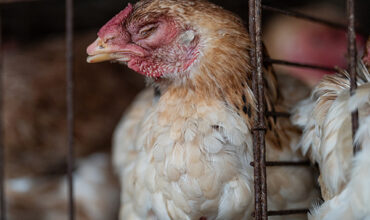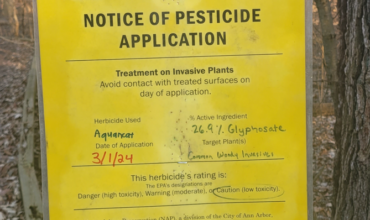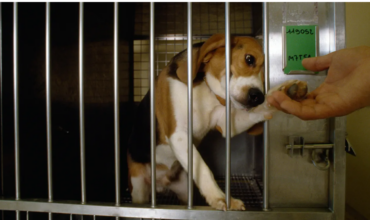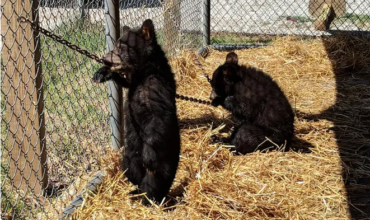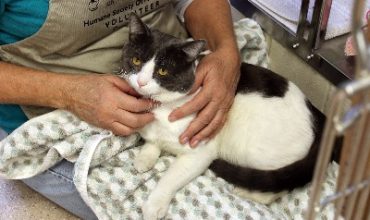Local governments are increasingly facing challenges from urban wildlife. As we expand into natural habitats—and restore green spaces and waterways—encounters with animals like deer, coyotes, and beavers are inevitable. What’s troubling is how often the response is reactive, violent, and uninformed. The recent killing of a family of beavers at Ann Arbor’s Leslie Park Golf Course is a case in point. Beavers are remarkably intelligent and ecologically vital—nature’s engineers. But when conflict arose, the only response was lethal removal – reportedly using gruesome Conibear traps that are illegal in Ann Arbor.. It was stated that there was a search for
Read More
Archives for Speaking of Compassion
What’s Next for Animals in 2025?
As you may know, the 2024 Michigan legislative session closed with a wail of despair. Near the end, the State House was unable to vote due to intentional member absence, leaving hundreds of bills to die — including a long list of important animal protection bills such as: Pet license plate (funding for spay/neuter and support for shelters) Cat declaw ban Animal Bond and Forfeiture (allowing a better process to get cruelty case animals out of shelters and into loving homes) Queenie’s Law (ending painful experiments on dogs) Veterinary telehealth expansion (to better help people and pets) Ban on pet
Read More
Laying it out there – Why eggs are expensive
The current egg shortage and skyrocketing prices have left folks confused and upset. While some blame inflation or humane farming practices, the primary cause is a bird flu outbreak, exacerbated by factory farming practices. Bird Flu and the Egg Crisis Since early 2022, the H5N1 strain of avian influenza has devastated U.S. poultry farms, resulting in the culling of over 130 million birds, including many egg-laying hens. This sharp decline in production has caused prices to surge. Yet, the poultry industry’s response has been baffling. To save costs, the agriculture industry has reportedly resisted implementing effective biosecurity measures, allowing the
Read More
Should animal cruelty victims be “jailed” for years while their abusers walk free?
I can’t imagine anyone answering “yes.” Most know even the nicest, most loving shelters, like HSHV, are not suitable homes. Long-term sheltering, where an animal spends most of their day caged, is damaging both physically and mentally. That’s why Michigan has an animal forfeiture law. To protect animal cruelty victims from further suffering, a prosecutor’s office can request a hearing that’s presided over by a judge who reviews the evidence, and decides if the animals can be released for adoption while the slow wheels of justice turn. However, many Michigan counties, including Washtenaw County, don’t pursue animal forfeiture. At HSHV,
Read More
What’s Glyphosate doing in our neighborhood?
I recently saw this disturbing sign in the park & nature area next to my home in Ann Arbor. I’ve lived here for roughly 25 years and have never seen such a sign. This lovely natural haven contains protected wetlands and is filled with furry wildlife, bats, songbirds, ducks, an owl or two, and a variety of trees, plants, and wildflowers. It is also a walking path for folks with dogs, the occasional orange kitty, moms with strollers, and kids going to and from school. If you are unfamiliar with glyphosate, I encourage you to do your own Googling to
Read More
Teddy’s Law: The good, the bad, and what we should do next
Teddy’s Law, recently signed into law by the Governor, was drafted so that dogs and cats used in laboratories can be adopted, instead of killed, when no longer of use. Big thanks to the lead sponsors, Senators Hertel and Polehanki, for working their hearts out to save animals who sacrifice so much. However, there were changes made before final passage that need our attention. Two bills were written to create Teddy’s Law: HB 148 requiring basic reporting on the number of animals used and released for adoption HB 149 requiring adoptions of research dogs & cats when no longer of
Read More
Please don’t feed the bears… or greedy humans
As summer comes to a close but our need for safe outdoor recreation does not, we need to be cautious about engaging in activities that sustain cruelty.
Read More
Animals and COVID-19
As you may have recently heard in the news, a tiger in the Bronx zoo became mildly ill and tested positive for COVID-19. There have also been media reports about a small study just published suggesting that domestic cats are susceptible. Dogs may be vulnerable too, but the evidence points to this being less likely. In this study, a few cats and kittens were injected with mega doses of the virus, contracted the disease and infected other cats. Understandably, these stories are adding to the confusion and worry about how to keep ourselves and our animals safe. But neither the zoo
Read More
For those crying Wolf
If you’ve heard of Ann Arbor’s annual deer killing you have probably heard that deer are overpopulated due to a loss of natural predators, specifically wolves, leaving us no choice but to hire sharpshooters. Since it continues to be repeated by elected officials as the basis for expensive public policy, I guess it’s time to stop rolling my eyes and to review a bit of wolf history and explain why wolves are not at the root of our problem and could never be part of the solution. It is true that wolves once roamed our entire nation, including our state
Read More
Food for Thought
Did you know that HSHV is a vegetarian organization? We don’t ever use donor money or sponsor events that entail meat (for human consumption, that is; feeding animals is a bit trickier) and are careful to avoid or to consider the sourcing of other animal-based food and products. We do this because not eating animals is another way we can help save lives. We do it also because of the rampant and pervasive cruelty in the industrialized farming industry, known as factory farming. It isn’t our job to tell folks what to eat, but it is our responsibility to increase
Read More




